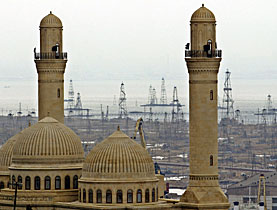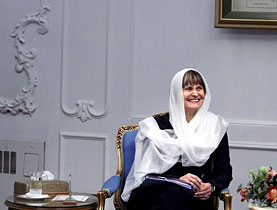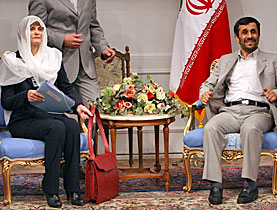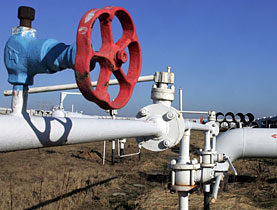Swiss seek the good oil in Azerbaijan

President Pascal Couchepin will begin a three-day visit to oil-rich Azerbaijan on Saturday, as Switzerland seeks to diversify its energy sources.
It comes shortly after cabinet colleague Micheline Calmy-Rey stirred up a hornet’s nest by witnessing a gas deal with Iran.
Couchepin’s visit promises to be less controversial: talks with the Azerbaijanis will focus on business and energy ties, as well as the bilateral relationship between the two countries and regional issues.
The former Soviet republic is of great interest to foreign investors because of its important gas and oil reserves.
Swiss cabinet ministers have met Azerbaijani representatives regularly over the past few years, signing a number of economic accords.
In 2006, agreements were reached on protecting investments and dual taxation. And last October, a cooperation deal on energy was signed, with the aim of guaranteeing supplies of oil and gas to Switzerland.
One company hoping to secure a deal in Baku is the Zurich-based Laufenburg Electricity Company (LEC). This was the firm which signed a 25-year deal with Iran in March, covering the delivery of 5.5 billion cubic metres of gas per year to Europe through a pipeline by 2012.
Controversy
When Calmy-Rey went to Iran to witness the deal she sparked huge controversy at home and abroad.
Jewish groups criticised her for “abetting” a gas deal with a country that threatens to destroy Israel. And many Swiss were unhappy that she wore a headscarf to a meeting with Iranian President Mahmoud Ahmadinejad.
Laufenburg is in talks to ship Azeri natural gas via the Trans Adriatic Pipeline, a project that the Swiss company is looking to build in collaboration with Norway’s StatoilHydro.
No agreement is expected during Couchepin’s trip. According to the president’s spokesman, Jean-Marc Crevoisier, the visit will be more of “networking” opportunity.
Couchepin will be meeting his counterpart Ilham Aliev – for the second time this year after the World Economic Forum summit in Davos – as well as the prime minister, Artur Rasizade, and the parliament speaker Oktai Assadov.
Switzerland’s relationship with Azerbaijan has been strong since the 1990s. The former Soviet republic has been part of the Helvetistan group presided by the Swiss at the International Monetary Fund and World Bank.
Swiss assistance
Swiss financial assistance started around the same period as a response to the Nagorno-Karabakh conflict and the displacement of hundreds of thousands of Azerbaijani citizens.
Since 1998, financial and technical cooperation projects have been underway, which include improving basic infrastructure, private sector development and policy advice.
The Azerbaijanis are hoping that the Swiss president’s visit will help boost economic ties, which have been growing over the past few years.
In 2007, Switzerland exported goods and services to Azerbaijan worth SFr84.6 million ($80.2 million) while imports totalled SFr36.6 million, according to the State Secretariat for Economic Affairs.
The Azerbaijanis want trade to go beyond oil and gas, says their ambassador to Switzerland, Elchin Amirbayov. “These exchanges are not yet what we would want,” he added.
Baku would like to be less dependent on its oil sector, and attract investors in other fields. Oil represents more than half the country’s Gross Domestic Product and nearly 90 per cent of its income.
Swiss companies are already in Azerbaijan. Cement maker Holcim is the nation’s biggest foreign investor outside of oil.
But the local authorities say there are opportunities for the Swiss in other sectors, such as tourism, information technology or even agriculture.
swissinfo with agencies
Azerbaijan was briefly independent from 1918 to 1920. It regained its independence after the collapse of the Soviet Union in 1991.
Despite a 1994 cease-fire, Azerbaijan is still at odds with neighbouring Armenia over the Azerbaijani Nagorno-Karabakh enclave, which is now largely populated by Armenians.
As a result of this conflict, Azerbaijan has been amputated of 16 per cent its territory and must support around 600,000 internally displaced persons.
The country has a population that belongs mainly to the Turkic ethnic group and is mostly Muslim.
The mainstay of the economy is the oil and gas sector, which was opened to western companies in 1994. The promised wealth has failed so far though to translate into better living conditions for all the population.

In compliance with the JTI standards
More: SWI swissinfo.ch certified by the Journalism Trust Initiative



You can find an overview of ongoing debates with our journalists here. Please join us!
If you want to start a conversation about a topic raised in this article or want to report factual errors, email us at english@swissinfo.ch.